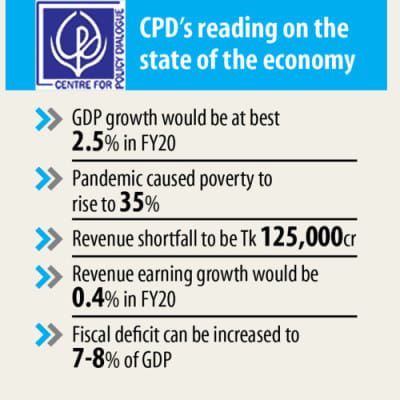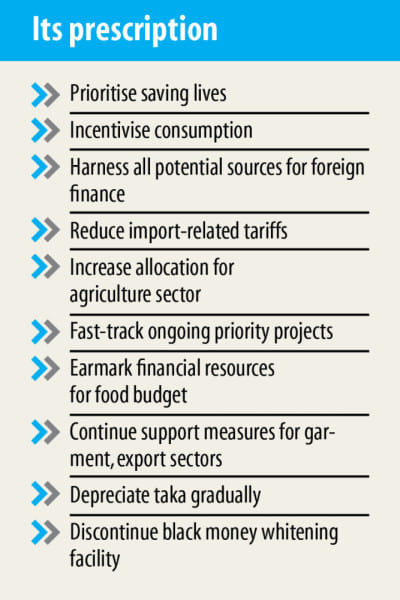Income inequality to balloon like never before

Income inequality is set to blow up to a record high this year, as the coronavirus pandemic continues to wipe out jobs and sweep away livelihoods, said the Centre for Policy Dialogue (CPD) yesterday.
The think-tank conducted an analysis to explore the implications of coronavirus in the short-term on poverty and inequality using the unit-level data of the Household Income and Expenditure Survey 2016.
The analysis has applied negative shocks on household consumption in the range of 9-25 per cent among household groups. This led to an increase of national (upper) poverty rate to 35 per cent in 2020 from 24.3 per cent in 2016.
At the same time, consumption inequality, measured by the Gini coefficient, rose from 0.32 in 2016 to 0.35 in 2020 and income inequality went up from 0.48 in 2016 to 0.52 in 2020, the CPD said in its independent review of Bangladesh's development, which was presented in a virtual media briefing yesterday.
The Gini coefficient is measured on a scale of 0 to 1; the closer it is to 1 the higher the inequality is in the society. A figure above 0.5 represents a severe income gap.
"We have been saying for the last few years that one of the major weaknesses standing in the way of GDP growth is growing inequality," said Mustafizur Rahman, a distinguished fellow of the CPD, in his observation.
It is not acceptable from the economics point of view and it is an ominous sign from the societal point of view, Rahman added.
Disruption of economic activities led to the loss of employment (in terms of the number of jobs or working hours), leading to a decline in income for a large section of the population, be it extreme poor, moderately poor, vulnerable non-poor or non-poor households, the CPD said.
Bangladesh's economy would grow at best 2.5 per cent this fiscal year because of the coronavirus pandemic, which, if materialises, would be the lowest in Bangladesh's history.
"We are thinking too much about GDP despite this pandemic -- we have to come out of this," said Fahmida Khatun, executive director of the CPD.

Reforms should get the highest priority.
"We have forgotten it. We neglect this every time. Reforms initiatives should be undertaken immediately. There is a fascination about GDP growth," she added.
The pandemic is having a significant impact on various aspects of the economy and will no doubt have important repercussions for fiscal 2020-21 budget, the think-tank said in a paper presented by Towfiqul Islam Khan, its senior research fellow.
But the research organisation, however, called for prioritising saving lives over everything.
"GDP growth rate should not be the anchor outcome variable for economic policies, including the national budget in the current context. Instead, the focus should be on saving the lives of people in the country and reducing the vulnerabilities of the marginalised groups."
Both the demand side (recession-induced) and supply side (lockdown-induced) disruptions are having adverse implications for Bangladesh's macroeconomic and sectoral performance, as the economy is being adversely impacted through a host of transmission channels, both global and national.
"The real challenge perhaps lies ahead."
The pandemic would trigger a record revenue shortfall of Tk 125,000 crore, it said, adding that revenue earnings in fiscal 2019-20 are likely to record a minuscule growth of 0.4 per cent.
"There is no beacon of hope in terms of revenue mobilisation in fiscal 2019-20," the paper said.
Subsequently, it has become critically important to identify the sources of fiscal space to underpin the government's intended fiscal policy stance.
"Realistic revenue mobilisation targets will be crucial for overall fiscal management."
The CPD proposed the government to raise the tax-free income threshold levels from Tk 250,000 to Tk 350,000.
The first three slabs of income tax from 10 per cent, 15 per cent, and 20 per cent may be restructured to 5 per cent, 10 per cent, and 15 per cent respectively, at least for the next two years.
To ensure the food security of low-income people, the reduction of import-related tariffs on essential food items should be considered.
It is to be anticipated that demands for incentives will rise given the pandemic. "The primary objective of all tax incentives should be to directly support the marginalised groups."
It is time to lose the 'fat' in the non-development public expenditure and this will be important to address the adverse impacts of the pandemic with suitable fiscal measures, the CPD said.
The annual development programme (ADP) for fiscal 2020-21 needs to ensure that the required allocative priorities are followed and inclusivity is maintained.
Better utilisation of project aid in the upcoming fiscal years will determine the overall pace of implementation and this is also important because of reducing the debt-servicing liability.
The higher budget deficit is understandable but financing-mix remains a key concern, the CPD said.
In the backdrop of subdued revenue mobilisation, the possibility of pushing the budget deficit beyond the traditional cap of 5 per cent of GDP may be a necessity given the upcoming fiscal year.
"However, this increased budget deficit should be managed through the appropriate diversion of available resources, proper sourcing and prudent use of resources."
The Financial Institutions Division has a plan to make it mandatory for insurance companies to invest a certain part of their investible funds in government securities and allow investment of undisclosed income in the capital market, the CPD said.
However, such black money whitening facility through voluntary disclosure of undisclosed income and investment in capital market discourages honest taxpayers while tax evaders are encouraged."
"It has also failed to register any notable response. This provision should not be continued from the next fiscal year."
With limited scope to further incentivise export and remittances, the central bank should consider gradual depreciation of the taka.
The government has come up with several policy interventions over the past few months in the form of several stimulus packages and monetary easing, and by providing reliefs.
"Regrettably, the policy response has not been adequate. The government has relied primarily on monetary policy tools (instead of fiscal stimulus as generally practised) as is manifested by the design of the stimulus packages."
The weakness of administrative capacity and lack of good governance have further limited the effectiveness of the government efforts, the paper added.
The next budget should be a cost-efficient one so that the government can implement it by spending less, said Khondaker Golam Moazzem, research director of the CPD.
There is scope to divert resources from sectors such as the power sector to the important projects and areas.
The CPD said the economic policies in response to the pandemic over the last couple of months were influenced by the false dichotomy between life and livelihood.
Putting the so-called 'life versus livelihood' debate on the table has misguided the policy discourse.
The decision to open up economic activities without taking proper precaution, plan and preparation is having a significant cost in terms of lives and sufferings of the citizens and sustainable recovery of the economy.
It is critically important to review the current state of the pandemic spread and take a planned phased approach to allow movements and economic activities.
"Saving people from loss of lives and sufferings ought to be the highest priority. The economic recovery should be measured and monitored in terms of poverty, inequality and employment," he added.

 For all latest news, follow The Daily Star's Google News channel.
For all latest news, follow The Daily Star's Google News channel. 



Comments